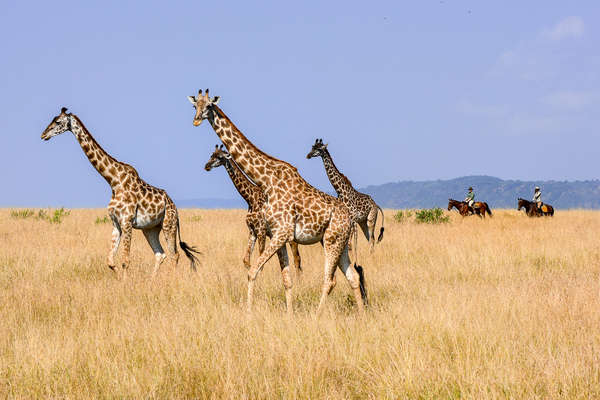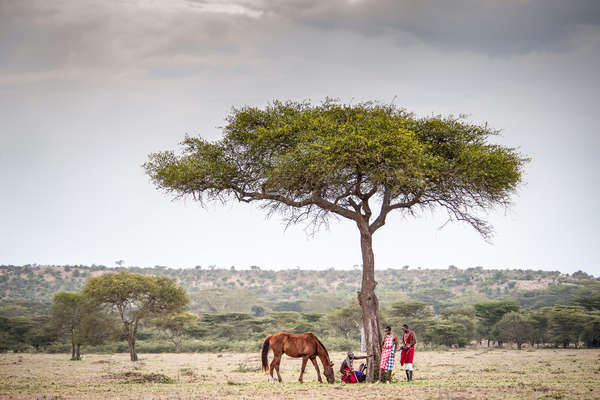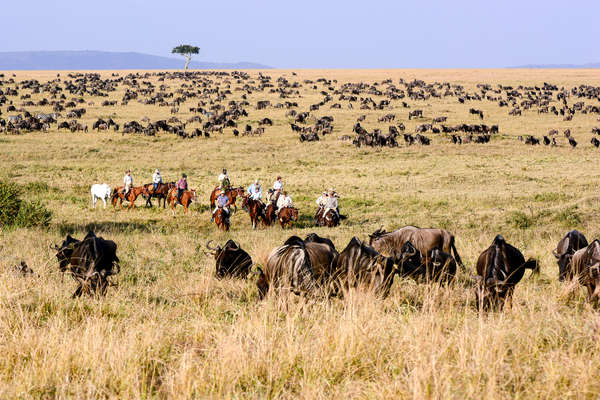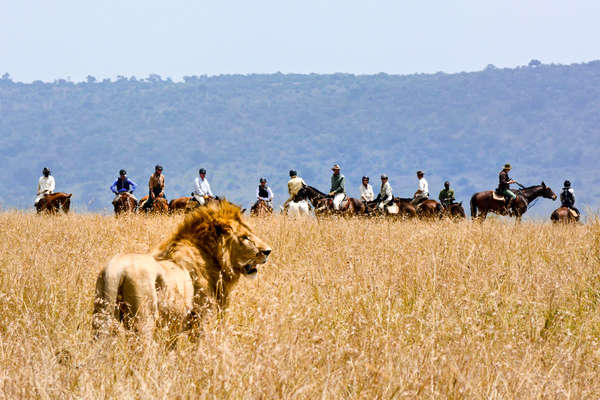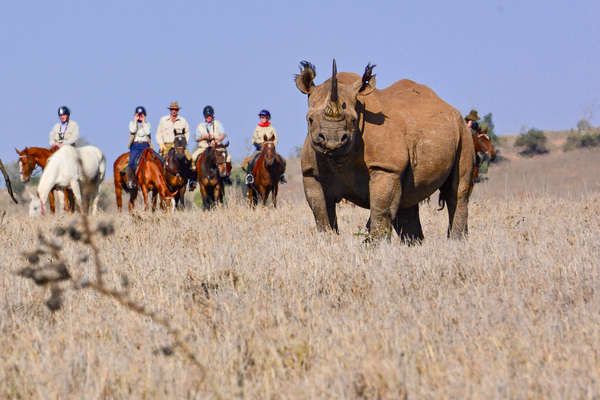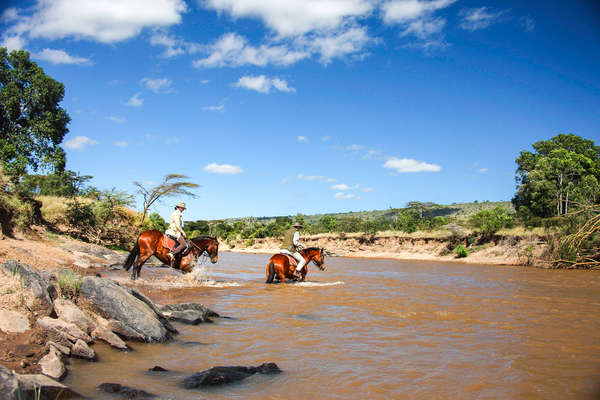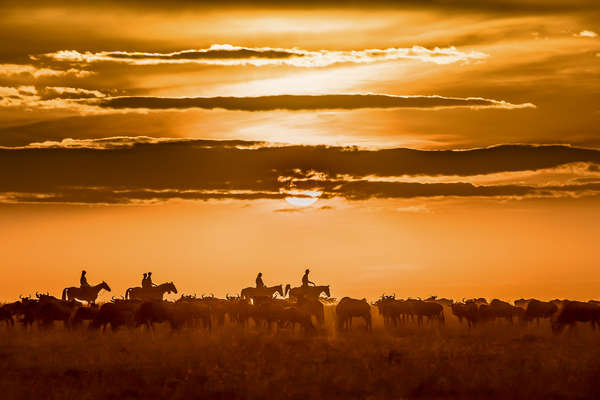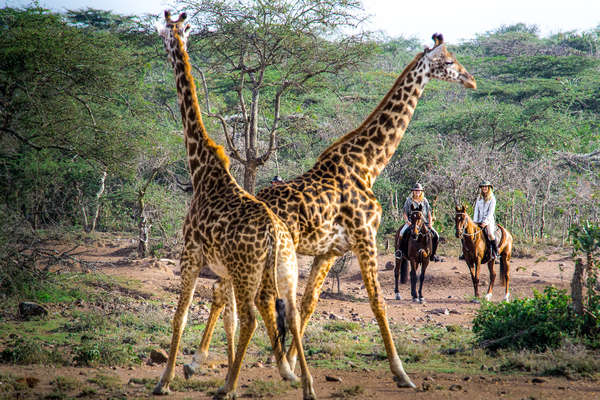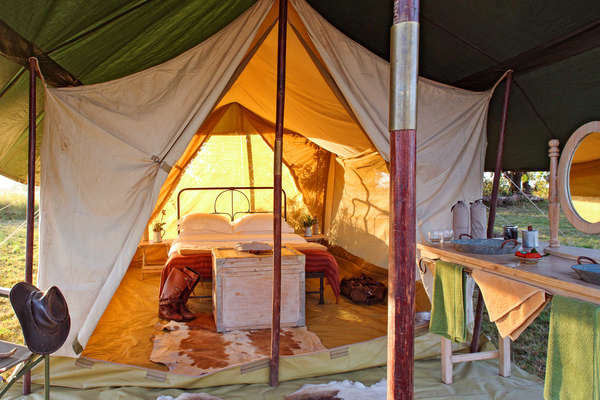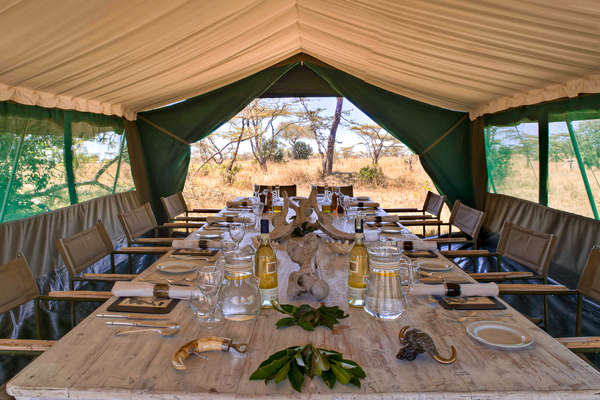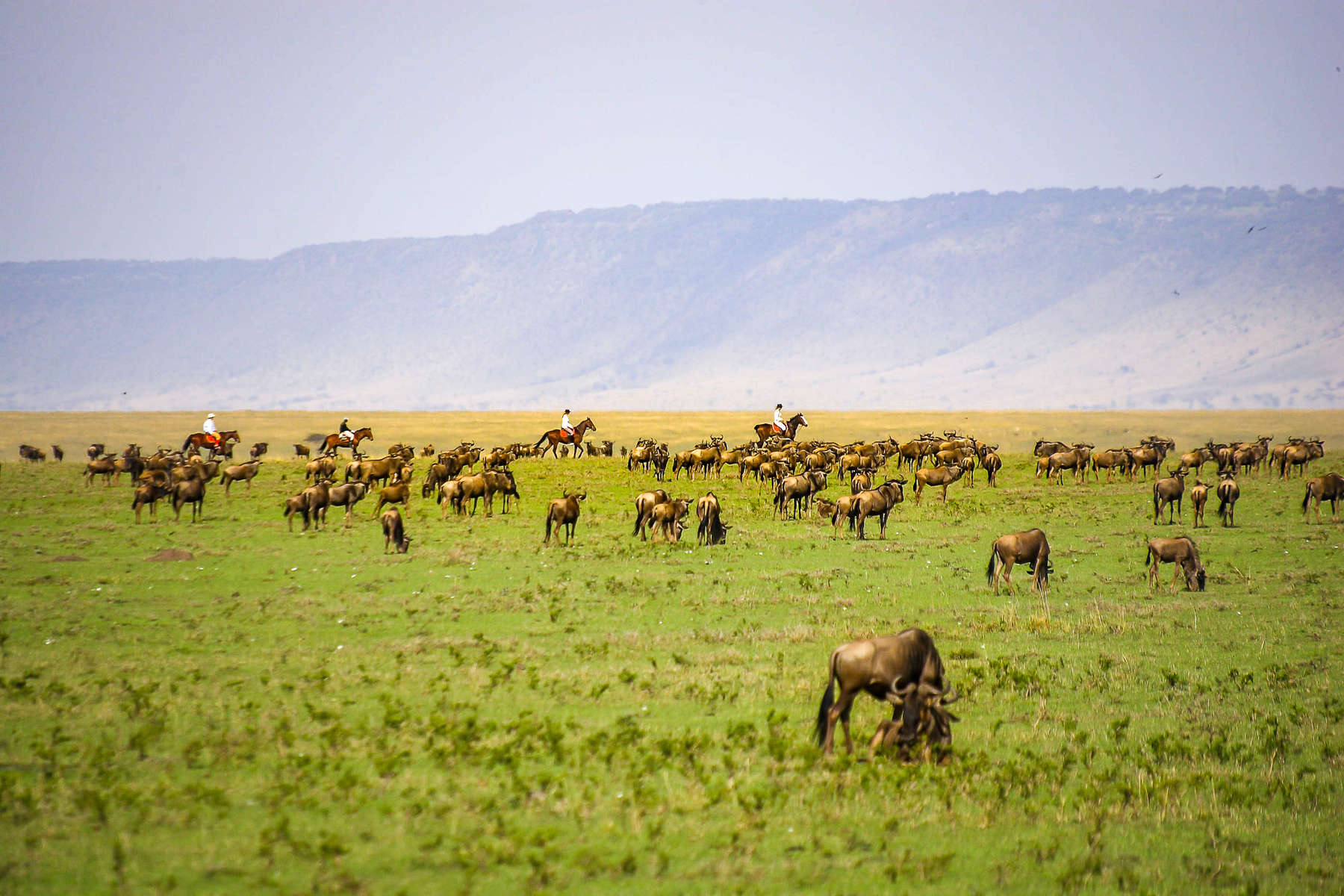
From the horse’s mouth
Itinerary
Highlights
- Large and comfortably furnished tents with twin or double beds and imported linen
- The true essence of a traditional safari with full immersion in the wilderness
- Camps are pitched in the most secluded and beautiful areas, offering ultimate privacy and luxury
- Interact with local Masai tribes as they tend their cattle
- The possibility of witnessing the greatest wildebeest and zebra migration in the world
- Fantastic game viewing in a true Big Five area
- Non-riders are very welcome and will be taken on game drives with experienced guides
Dates & prices
Price details
- Rates are per person, based on two riders sharing a twin or double tent during the ride.
- All internal air and road transfers are included, as well as local conservation fees.
- Groups are composed of a minimum of 4 riders and a maximum of 12 international riders, plus guides. A rather large small group supplement might apply for four guests or less (please contact us).
- There is no single supplement if you are willing to share a tent with another guest of the same sex. To guarantee your own room/tent there is a single supplement of $2500/£2000/€2295 (2025) or $2750/€2650/£2230 (2026)
- The above dates are set departures but it is possible to schedule additional dates for private groups - please contact us for details.
- Shorter 6 nights rides are also possible - please enquire for details
- Max. weight limit of 90 kgs. Heavier riders might be accommodated with shorter rides, game drives and walks - please contact us.
Please Note
The itinerary may be modified at anytime for security reasons, meteorological or events beyond our control such as blocked roads, rivers in flood, drought, strikes and local holidays. Equus Journeys, our local partners and their local guides will always strive to find the best solution and will alter the itinerary as needed.
The names of the hotels and accommodation are given for information only and depending on availability, they may be modified without notice and replaced by another of a similar standard.
Price includes
Logistics
Full safari crew
1 horse equipped with saddle and bridle per rider
Support vehicles and trucks
Inland transport
Accommodation
Additional equipment
Flying Doctors' membership
Extras
Conservation fees
Price doesn't include
Transport
Extras
Insurance
Visas and personal purchase
Optional
Accommodation
Hotel nights in Nairobi
Equestrian info
Horses
Guide & local team
Gordie along with his wife Felicia and their experienced team offer one of the friendliest yet professional safaris in Africa.
Each riding safari is personally guided by Gordie, with Felicia on hand to assist with the horses.
Minimum riding ability
Minimum riding ability
The guide will assess the capability of each participant and should he feel that any rider is not competent and therefore imposes a risk to themselves and others, he will ask them to continue the safari in a vehicle rather than on horseback.
Max. weight limit of 90 kgs. Heavier riders might be accommodated with shorter rides, game drives and walks - please contact us.
Pace
Tacking ability and participation
Trip conditions and Requested experience
Equestrian equipment
We recommend our riders to wear a helmet to the correct standard and you should bring your own to ensure a proper fit.
Travel info
Comfort
Meals
Special dietary requirements can be catered for with advance notice and every effort is made to accommodate special requests.
Climate
Tips
Packing list
Our Recommendations
- Please don't take a hard sided suitcase. Your luggage should be soft sided, particularly for light air transfers. There is usually a luggage limit of 15kgs including hand luggage.
- Wherever possible you should wear neutral colours, such as beige, brown or natural bush colours for riding as bright colours, such as red, yellow or white can startle the wildlife and they will see you long before you've seen them.
- Evenings are nice and relaxed, and long sleeves and light trousers are recommended to avoid mosquitoes!
- We recommend travelling in your riding boots and carrying your hat and some riding clothes in your hand luggage - then if your luggage goes astray you are still able to ride!
- Carry a copy of your passport and insurance details with you.
Head
- Equus Journeys strongly recommend that you wear a riding helmet and that you take your own to ensure a correct fit.
- Sunhat for when not riding
- Sunglasses - with a cord attached so they don't fly off when riding
- Buff or bandana
Upper body
- Long sleeved shirts provide protection from the sun and thorns
- T-shirts
- Fleece, jumper or jacket - the evenings can be cold
- Waterproof jacket - the rains can be difficult to foresee and it's better to be prepared.
- Casual clothes for the evening
Legs
- Lightweight, comfortable riding trousers or jodhpurs - we recommend riding in them at home before taking them on holiday to ensure they don't rub
- Shorts for lazy lunchtimes
- Casual clothes for the evening
Hands and Feet
- Comfortable riding boots. We recommend short boots with half chaps but you may wish to take long chaps to protect against thorns. We don't recommend taking your favourite long leather boots in case they get damaged
- Sandals, flip-flops or trainers for moving around the lodge and camp
- Gloves - your hands are particularly exposed to the sun whilst riding
Nightwear
Medical kit
- Sunscreen and lip balm - must be high factor
- Insect repellent, preferably containing deet
- Any medication you regularly take
- Blister plasters in case of any rubs
- Antiseptic cream, plasters, aspirin, anti-histamine, insect-bite salve etc...
- Spare prescription glasses/contact lenses
- Anti malarial tablets and Yellow Fever Certificate if required (check with your doctor)
Other useful items
- Binoculars for viewing game
- Camera and high capacity memory card. Spare battery.
- Bumbag for carrying your camera and small items whilst riding
- Headtorch or torch for moving around camp at night
Sustainable tourism
- Travel light. It's a little known fact, but the lighter you pack, the better for the environment as heavy bags will produce higher emissions (when flying a plane or driving a car!).
- Reduce plastic waste. Take your favorite reusable bottle with you. Avoid single-use bags, cups, or straws.
- Preserve nature. Always take your rubbish with you during the ride and recycle them. Leave all the flowers or plants as you found them, and never get too close when observing wildlife. Make sure to use eco-friendly products such as body wash or laundry detergent (if camping) to protect both your skin and the environment.
- Choose your experiences carefully. Respect animal life by not participating in any activities that abuse wild animals (shows, elephant rides, etc.).
- Support local populations. Buy local handicrafts, be respectful of customs, and learn about the culture of local communities.
- Share! Raise awareness among your family and friends about sustainable tourism.
Did you know?
Did you know?
The world famous Wildebeest migration is not just restricted to Kenya - the herds are permanently on the move through Kenya and Tanzania. The exact timings of the migration are governed by rains and the supply of good grazing grasses, but the following offers some guidance.
In late November, after the short rains, the Wildebeest can be found on the short, grassy plains of the Serengeti near to the Ngorongoro crater. They remain here through December, January, February and March, giving birth to their young around February time. Around April they start their migration westwards and northwards in search of better grazing and water. In May they can be found around Seronera in Tanzania where they are joined by vast numbers of zebra and Thompson's and Grant's gazelles. In June they reach the Grumeti river and congregate here for a while before crossing and heading north into Grumeti and the northern Serengeti during July and August.
September is the most dramatic month with the herds reaching the Mara River, gathering in huge numbers and then crossing the river in a spectacular display of panic and confusion, with many being taken by crocodiles. They then arrive in Kenya and graze the plains of the Maasai Mara through September and October before heading south again and back into the Serengeti in Tanzania.
To view the migration on a horse riding safari you should choose dates around September/October. Other dates throughout the year offer different highlights - Kenya is a Big Five destination and game viewing is superb throughout the year.

